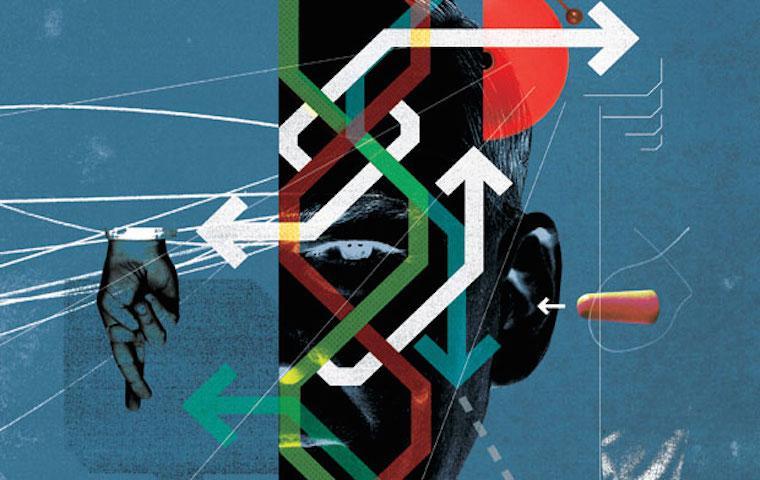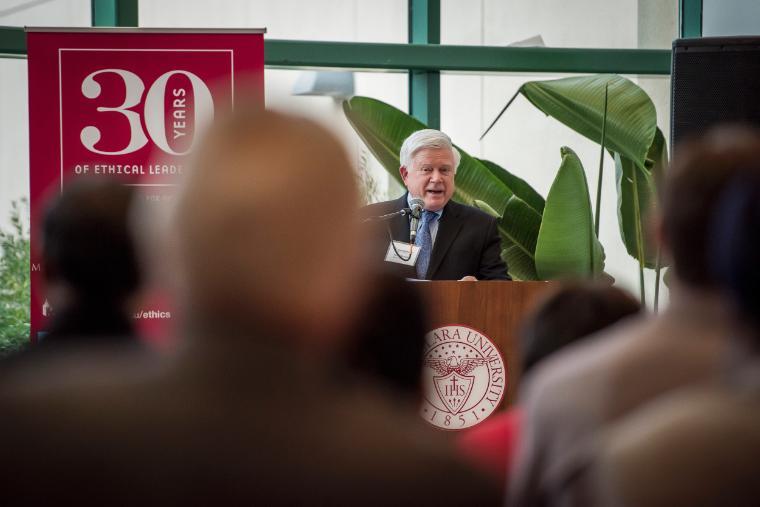
Ethically Speaking
Ethics. We all hear about it, but do we really understand what it means to the world around us?
Tina Vossugh
Kirk O. Hanson is executive director of the Markkula Center for Applied Ethics at Santa Clara University, coordinating the activities of over 20 staff members who work directly for the Center and 50 affiliated faculty scholars who work on all aspects of applied and professional ethics. I had a chance to sit down with him to learn more about the work he and his staff do at the Markkula Center for Applied Ethics.
Why do ethics matter?
Ethics is more important today than it's ever been. Ethics is about good behavior, and good behavior by individuals and institutions shapes the society that we live in. If we want a good society, we have to have ethical individuals and ethical organizations. In an increasingly global and partisan environment, the Markkula Center for Applied Ethics has got to double down to emphasize the importance of ethics and ethical behavior, or I believe we will continue to see a diminishing of the society in which we live.
How do you think being in Silicon Valley informs the work of the Ethics Center?
Ethics is discussed in Silicon Valley more frequently than in other parts of the United States because we encounter such massive changes in technology and society here first. California is the hotbed of social and technological innovation, and questions which arise from social media and its influence on society are faced here in the Valley first. Questions of bioethics and the manipulation of genetics are faced here first, and the Ethics Center is engaged in the debate over those breaking new technologies.The Center is able to address those questions earlier than most other institutions across the United States.
If you could give one piece of advice to a CEO, what would that be?
The most important thing CEOs need to do is to create an ethical culture within the organizations that they lead, and you create an ethical culture first by personal example. The ethical quality of an institution will never rise above the level of the ethics of the CEO. Secondly, the CEO has to take seriously the fact that ethical choices are encountered every day by people at every level in the organization, and the company must be open to addressing those difficult choices that individuals face. If an employee does not perceive managers to be open to discussing difficult ethical choices, they'll conclude that the company does not want to act ethically or wants to hide from the toughest decisions.
If a young person has never encountered the concept of ethics as he or she starts a college education, what’s your advice to them?
The most important thing a student needs to realize is that ethics is an everyday concern rather than a once-a-year concern. Even a freshman makes ethical choices day in and day out. How much to study? How much to party? How to deal with the dating scene and respect for partners. Freshmen will face a difficult set of decisions around cheating on papers and tests. They will also face difficult questions with roommates in terms of how they negotiate to get along.. At the Ethics Center, we teach every person to ask basic questions such as Who is hurt or helped by a decision? What is fair? What respects the dignity of everyone a decision touches? What contributes to the common good? and What decision embodies key virtues such as honesty, compassion, and accountability? Those are simple concepts, and we hope that every freshman is armed with them by the required ethics course taught at freshman year.
What makes you excited to come to work every day?
As an ethicist for forty years, there is never a dull day. Every morning, I look forward to reading the newspaper because I know that there are going to be five really meaty ethical questions on Page 1 that I'll be dealing with for the rest of the day. How does one deal with privacy issues? How does one deal with Russian hacking? How does one deal with the dilemmas of intervention in Syria? That’s the stuff of ethics, and there is never a day where there aren't difficult questions to contemplate and to work on!
Read more about the Markkula Center in Santa Clara Magazine
Illustration by Stuart Bradford
